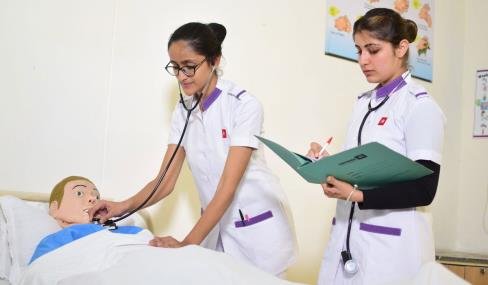Pursuing nursing courses after the 12th can be one of the most rewarding decisions for students aspiring to make a significant impact in healthcare. Nursing is not just a profession; it’s a calling that requires compassion, dedication, and a strong desire to help others. With the increasing demand for healthcare professionals, nursing courses after 12th offer various pathways for students to enter this noble field. This blog post will explore multiple nursing courses available after high school, their eligibility criteria, career opportunities, and more.
The Scope of Nursing
Nursing courses after the 12th encompass a range of programs designed to equip students with the necessary skills and knowledge to provide patient care effectively. The healthcare sector is evolving rapidly, creating many opportunities for trained nursing professionals. These courses prepare students for various roles in diverse healthcare settings, such as hospitals, clinics, and community health organizations, from bedside care to administrative positions.
Popular Nursing Courses After 12th
There are several nursing courses after the 12th, each catering to different interests and career goals. The most common programs include:
B.Sc. Nursing
Bachelor of Science in Nursing (B.Sc. Nursing) is a four-year program that prepares students for professional nursing practice. It combines theoretical knowledge with practical training in clinical settings. Students who complete B.Sc. Nursing can work in hospitals, schools, and community health organizations, making it one of the most sought-after nursing courses after 12th.
ANM (Auxiliary Nurse Midwifery)
The Auxiliary Nurse Midwifery (ANM) program is a two-year diploma course on basic nursing and midwifery skills. ANM graduates are crucial in providing primary healthcare services, particularly in rural areas. This course is an excellent option for those looking to enter nursing quickly.
GNM (General Nursing and Midwifery)
General Nursing and Midwifery (GNM) is a three-year diploma program that trains students in various aspects of nursing and midwifery. GNM graduates can work as registered nurses in hospitals and healthcare facilities. This course is ideal for those who want comprehensive training in nursing practice.
Post Basic B.Sc. Nursing
For those who have completed a diploma in nursing, the Post Basic B.Sc. Nursing programs offer an opportunity to earn a degree while enhancing their skills. This two-year course is designed for registered nurses who wish to advance their education and career prospects.
Eligibility Criteria for Nursing Courses After 12th
Eligibility criteria for nursing courses after 12th can vary based on the program and the institution. Generally, the following criteria apply:
- B.Sc. Nursing: Candidates must have completed 12th grade with Science (Biology, Chemistry, Physics) and secured a minimum percentage (typically 50%).
- ANM: Students should have completed their 12th grade in any stream, with a minimum percentage requirement varying by institution.
- GNM: Candidates must have passed their 12th grade with Science (Biology, Chemistry, Physics) or any vocational course related to health care.
- Post Basic B.Sc. Nursing: Applicants should hold a GNM diploma and be registered nurses.
Admission Process for Nursing Courses After 12th
The admission process for nursing courses after 12th typically includes the following steps:
- Application: Interested candidates must complete the application form for their desired course and institution.
- Entrance Exams: Some institutions conduct entrance exams for nursing courses after the 12th grade. Preparing for these exams is essential to secure admission.
- Interviews: Shortlisted candidates may be called for an interview, where they will be assessed on their motivation, communication skills, and passion for nursing.
- Final Selection: Institutions will announce the final list of selected candidates based on their performance in entrance exams and interviews.
- Curriculum Overview of Nursing Courses After 12th
Nursing courses after the 12th cover many subjects that equip students with the necessary skills to excel in the field. The curriculum typically includes:
- Anatomy and Physiology: Understanding the human body and its functions.
- Microbiology: Microbiology is the study of microbes and how they affect people’s health.
- Nursing Foundations: Learning basic nursing skills and patient care techniques.
- Community Health Nursing: Promoting health and preventing disease in communities is the main goal of community health nursing.
- Psychiatric Nursing: Understanding mental health issues and providing care for patients with psychological disorders.
Career Opportunities After Completing Nursing Courses
Completing nursing courses after the 12th opens up numerous career opportunities for graduates. Some potential job roles include:
- Staff Nurse: Direct patient care is provided by staff nurses in clinics and hospitals.
- Community Health Worker: Working in community health programs to promote wellness and prevent diseases.
- Nurse Educator: Teaching and training aspiring nurses in academic institutions.
- Clinical Nurse Specialist: Providing specialized care in pediatrics, geriatrics, or critical care.
- Healthcare Administrator: Managing healthcare facilities and ensuring the delivery of quality care.
Salary Expectations for Nursing Professionals
The salary of nursing professionals can vary based on factors such as education, experience, location, and specialization. On average, B.Sc. Nursing graduates can expect to earn a starting salary of INR 3 to 5 lakhs per annum. With experience and additional qualifications, this can increase significantly, especially for those in specialized roles or managerial positions.
Importance of Continuing Education in Nursing
The healthcare field is constantly evolving, and so are the best nursing practices. Continuing education is crucial for nursing professionals to stay updated on the latest advancements in medical science, technology, and patient care practices. Many institutions offer specialized courses, workshops, and seminars for nurses looking to further their knowledge and skills. Higher education, such as a Master’s in Nursing, can also open doors to advanced career opportunities.
The Role of Technology in Nursing Education
Technology plays a significant role in modern nursing education. Many nursing courses after 12th now incorporate online learning platforms, simulation labs, and digital resources to enhance the learning experience. These tools help students gain hands-on experience and understand complex concepts more effectively. Integrating technology in nursing courses also prepares students for the tech-driven healthcare landscape.
Conclusion:
Pursuing nursing courses after the 12th is commendable for those passionate about healthcare. With various options available, students can select a program that aligns with their career goals and interests. The demand for skilled nursing professionals is rising, making this field a stable and rewarding career choice. As you embark on your journey in nursing, remember that compassion, dedication, and continuous learning will be your keys to success.

